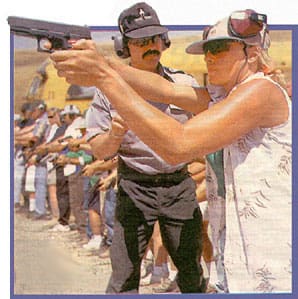Does attending a single class constitute training? What if the instructor is a high-speed low drag bad ass… is it training then? What if I take one class a year? Is that considered training? Personally, I don’t think so. By definition, sure, you are training every time you attend a class. But to me, training is not just about sitting in a room with linoleum tile and uncomfortable chairs. Getting solid instruction is a big piece of training yourself, but ultimately even a 24-hour 3-day course might not be enough to save your life . . .
Training is about more than getting instruction. If you want to truly be prepared for whatever comes your way, it’s what you do between classes that matters the most. Attending a class helps show you skills that you’ll need. The instructor helps you perfect and integrate those techniques and tactics into your skill set. When you go home it’s your job to perfect and maintain them.
If you want to get to Carnegie Hall, that means practice. And lots of it. We don’t all need to practice every day, but when push comes to shove the length of time since our last training session will matter more than the length of the training session itself.
You can get by attending only one class a year, but only if you are practicing on your own to keep your skills sharp. Training at least monthly is a realistic goal most shooters can work toward. Even if that just means dry firing for half an hour once a month. Even that much will help keep your skills fresh. Obviously training every day would be more beneficial, but we live in the real world where most people’s lives won’t allow that time of time commitment.
Practice is what will make your reaction to an assault resistant to the disastrous effects of stress. Practice is what will win the day when your life is on the line.
Getting good instruction is a great start, and I certainly recommend taking classes regularly. But if you don’t practice what you learn, then you are leaving to chance that you will be able to defend yourself or your family when it really matters.
If you liked this post, check out www.IndestructibleTraining.com, Nick Savery’s blog discussing integrating training across a variety of systems and platforms for the purposes of self-defense.





It is definitely training. It’s just not enough training as the author has suggested.
In the martial arts, earning your Black Belt is seen as a mastery of the basics. It is what you do beyond those basics that truly improve your skills.
Good point.
In most Japanese systems, 1st degree blackbelt (1st dan) is referred to as shodan, meaning beginners level. Earning a blackbelt is more or less proving you have the basics down enough to start studying for real.
“Training is about more than getting instruction. If you want to truly be prepared for whatever comes your way, it’s what you do between classes that matters the most. Attending a class helps show you skills that you’ll need. The instructor helps you perfect and integrate those techniques and tactics into your skill set. When you go home it’s your job to perfect and maintain them.”
You read my mind. That is every point I was planning on making after reading the first paragraph.
Training classes are much more ‘class’ than they are ‘training’. You go there and you learn skills. You learn the technical aspects of manipulating a firearm/the mechanics of a DGU/ clearing a house etc. They don’t have time to “train” you to draw upon these skills reflexively. Nor do most people attend these classes often enough to maintain or even improve those skills. Once you leave the class, the instructors can’t do a thing to keep you sharp or make you better. That burden is on you.
I’m not saying you have to go to the range, do drills and courses of fire, and spend a couple hundred bucks on ammo every single weekend. All it takes is an hour or so a month. Just make it habit. Whenever you get some downtime around the house. Practice. Practice your garment clear, draw, presentation, trigger management (ie dryfire). Practice switching hands and aiming with the other eye. Practice slicing the pie. Practice your dropouts (which I’m awful at). Practice your Gooseneck grip. Do it slow but do it perfect. When you’re alone, rehearse what you’d say to someone who was approaching you -in a dark parking lot/garage – at a gas stationg aggresively begging – insisting on helping you carry groceries into your house so it won’t feel so awkward when you do have that happen. Practice. Practice. Practice.
You don’t have to be a Killer Navy Ghost Ninja Seal Commando Bad Azz. You just need to be able to access your skills reflexively.
One of the best classes I’ve ever taken was from Christian at American Firearms School, and I learned that I still have a lot to learn. You can never have enough training or practice, and everyone should try and learn something new as often as possible.
It’s ironic that most of the successful DGUs that we read about were performed by people with no training. On the other hand, a lot of the gun f^ckups that we read about were committed by highly-trained police officers.
Hey, I’m not disrespecting training. Training is great. Training is like a college education for gunnies. The problem is that most trainers are ex-mil or ex-cops. They teach what they know. And what they know is useless to me.
Nice article.
You don’t have to be good to win, you just have to be better than your opponent. Your tactics and be bad as long as your attacker’s is worse.
I train to be better than any opponent I might meet.
If you find yourself in a fair fight, your strategy sucks.
Good line.
I’d rather be lucky than good.
Most criminals are not exactly the brain trust or Seal Team 6 and are relying on the fact that they have more and better weapons than the usual unarmed citizen who is code white. Citizens being armed and aware would probably take the majority of them by surprise.
That’s a pretty bold generalization. I can think of plenty of large PDs that have to strain just to keep all of their sworn personnel qualified on firearms let along give them any kind of supplemental firearms and tactics training. On the other hand there are many PDs that do a great job training rank and file officers.
Just keep in mind many of the top CCW trainers such as Tom Givens or Mas Ayoob have LEO backgrounds. Although what they know is useless to you, it may be of good use to citizens choosing to expand their firearms experience past the basic NRA gun safety course.
If you fight like a cop, you have a good chance of going to prison, especially in non-SYG states.
The cop’s job is to take down the BG. By law, under penalty of a long prison term, my job is to GTFOO Dodge without getting hurt. There’s a huge difference in results and in tactics. The law for LEOs and non-LEOs is also completely different. Plus, if I get into trouble on the street, it’s not like I can call a few dozen buddies with automatic weapons for backup.
And there’s no blue wall of silence on your side if you **** up.
I would say that there is a great deal of difference legally, manpower, and resource wise between M &P versus private self defense efforts.
Just because something is great for the cops or troops, does not mean it is great for you.
Neither Tom Givens nor Mas Ayoob train students to fight like cops and both come from LEO backgrounds.
Glad you have a more realistic perspective than Ralph does. He may think past LEO experience is useless, but guess who will be investigating your DGU. The police. Yes, police and military train differently than civilians. They also have several of magnitude more experience with real bad guys in real life combat.
No kidding and Amen!, Brother.
“By law, under penalty of a long prison term, my job is to GTFOO Dodge without getting hurt. There’s a huge difference in results and in tactics. ” In other words, live to fight another day.
Don’t get into any kind of fight if you can avoid it. Like my Dad used to say, the fight that you don’t get into is the fight that you win.
Even if you’re the most bad ass, high speed, low drag, tacticool, ninja operator, you probably have better things to do than defending your honor and civilization from some lesser citizen/miscreant. Rarely does anything good come from a violent altercation.
Training is good, certainly much better than a fight for one’s life. Train as much as your time and wallet allows. Train wherever and whenever you can. Do your best to develop the warrior mindset. Don’t obsess, don’t be paranoid; just keep your head in the game.
Classes, dry firing, working from a holster and/or concealment are all good. Take a minute or two, here and there, throughout the day, to clear your mind and focus on one scenario or another. Harden yourself, make yourself a tough target.
As the Scouts say; Keep yourself physically strong, mentally awake and morally straight”.
Always remember that YOU and YOU alone are the weapon; everything else is just a tool or an accessory.
Second that. The BG also knows you are not a cop and will act accordingly, i.e., he knows you can’t legally pursue him. Why do you think most DGUs don’t involve pulling the trigger? BG sees a gun and bugs out failry confident that you aren’t going to run him down and shoot him. Against the police it’s a different story — surrender or duel to the death.
I have to agree that all of us, me included not only need refreshers but need to spend time at the range honing our skills. I am sure many of us spend a ton of time at the range. It is always better to be confident in your skill set and also have a better understanding of your own weaknesses as well.
Since it looks like that is Front Sight Academy in the picture, maybe now I can ask this question. I have a couple of low cost two and four day handgun classes that I paid for a while back. I constantly get emails from FS offering really good deals or purchasing someones returned contract. My question, is Front Sight legit, or is it some sort of ponzi scheme that just keeps getting new members (who will never be able to afford the trip to Nevada) to pay for the few that do utilize the training offered? If this isn’t the time or place for this question, then RF delete it.
is Front Sight legit, or is it some sort of ponzi scheme that just keeps getting new members
My question also.
I went to Front Sight a few months ago for their 4-Day Defensive Handgun course. Great training from a good organization.
Personally, there was way too much for me to learn all of it in just 4 days. (I’m not athletic, in that I don’t have the ability to easily learn body motion skills.) However I still learned a lot, and really improved my knowledge and my skills.
The Memberships stuff seems a little hokey to me too. I haven’t and probably never will buy a membership.
Try one course from them. I think you will like it.
Thanks Bob. Like I said, I bought a two and four day course a couple of years ago, but haven’t been able to get out there to use them, which I would imagine is the case for many across the country. So for the few that can make it, and have purchased the memberships that allow unlimited access, I figured all of the rest of us that might not ever make it, are paying for those that can.
“Does attending a single class constitute training? What if the instructor is a high-speed low drag bad ass… is it training then? What if I take one class a year? Is that considered training? Personally, I don’t think so. ”
It depends on what I am training for. I do not imagine myself to be a ninja assassin, nor am I going to join SEAL team 6. I was an NRA instructor for over 15 years, and way back in the day, I used to shoot competitively on a local level in bullseye matches. Today, I just want to be able to get sights on target, keep my familiarity with my various handguns, and enjoy shooting safely. I am lucky if I have time for even that.
Like people have said above: It depends on what you’re training for.
When I used to do Olympic air-rifle competetive shooting, I would train for two and a half hours twice a week with coatches, supplemented by one and a half hours a day in the basement on my own, shooting off god knows how many match grade pellets. And after all that I still sucked.
Now my “training” for a hunting trip is going to the range to confirm zero on the rifle, walking through the brush behind my house to re-perfect my attempted quiet walk, and shooting the breeze with my buddies.
If you wanna shoot like a Navy SEAL, then you’re going to have to train like one. If you want to be able to shoot well enough to protect yourself and your family, and still have a normal life, do what Derek said above.
The reason firearms are so valuable to armies and individuals is that unlike a sword or a long bow, they don’t take much training to use effectively. Especially for someone who wants to have the ability to stick a small pistol a few feet from another person’s face and shoot them, there is almost no training required. You only need to be trained to point and pull a trigger, provided you can talk someone else into loading it.
There’s nothing wrong with training, and I support firearms training. I deplore, however, the snobbish conceit that firearms are only effective if you pay someone for training and you remain dedicated to constant practice. Sure, you get better, but most times it just isn’t necessary.
It’s kind of like those classes for Microsoft Office. You don’t need classes if you just want to type memos. But if you want to build a spreadsheet with macros and pivot tables to make reports to the company CFO you’d better be good at it.
So, memos = firearms, macros = swords, and pivot tables = long bows?
Where do SQL queries fit in all of this?
A good friend – a law enforcement officer who has survived and prevailed in 3 gunfights – told me that his most important “lesson learned” from those real incidents was this: under stress, you’ll have about 75% of the skill you had on your worst day of training. Interestingly enough that tracks with advice I’ve gotten from top competition shooters. Everyone that’s really good with a gun says frequency of practice and consistency of practice is what matters. Tom Givens has had 57 students win real gunfights in the past 5 years. He recommends a few short sessions of dry practice a few times a week, which cost you nothing but time. That’s based on adult learning theory that says (wait for it) that frequency of practice is more important than quantity. You’d be better off dry firing 5 minutes every other day than taking one 1000 round multi day class and doing nothing the rest of the year.
I can’t agree with that more. Constant and consistently good gun handling will be more training than 99% of gun owners are willing to put forth.
The problem I see is that many people incorrectly assume that just because you have LEO training means that you are either in one or the other “class.” Keeping an open mind and taking training from both sides of the aisle really helps you capitalize on the best of both worlds while gaining a valuable perspective often lost on people quick to bash LEOs and their training. It’s definitely true most LEOs don’t receive enough in-service on firearms considering every fight they are in is in fact a “gun fight,” but there are those who take every training opportunity no matter who is teaching.
Comments are closed.